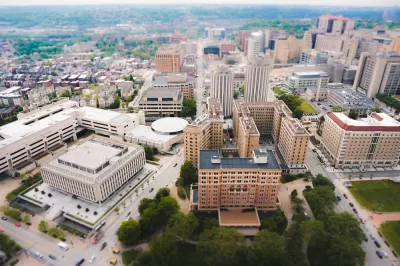The Pittsburgh City Council gave the green light to a zoning amendment that could eventually produce 1,000 apartment units planned for the neighborhood of Oakland.

The Pittsburgh City Council voted recently to move forward with zoning changes to accommodate a new subdistrict development that would add 1,000 apartment units and amenities to the neighborhood of Oakland. The zoning amendment is now onto the city's planning commission for a hearing and a recommendation.
Mark Belko reports on the council's vote, unanimous despite the opposition of some in the neighborhood, like the Oakland Planning and Development Corporation, "a registered community group that has led the fight to delay action, ripped council’s decision." Opponents are hoping the city would wait to approve the zoning changes until the completion of a neighborhood master plan.
Hanging in the balance is a proposal by developer Walnut Capital "to add a new subdistrict to five existing public realm districts in Oakland," according to Belko. "The change would accommodate its proposal to add 1,000 apartment units and other amenities in the central and south parts of the neighborhood."
Councilmember Bruce Kraus, who represents the neighborhood of Oakland, negotiated changes to the zoning amendment for the project that include "drastically" reduced building heights, according to Belko.
The development, as currently planned, could include more than six new apartment buildings, with no allotment for affordable units. The legislation would require, however, "that at least 10% of the units in an apartment complex be designated as 'walk to work' housing. Those units cannot rent for more than 30% of a person’s gross income."
FULL STORY: City pushes ahead bill that would aid developer’s plan for Oakland

Planetizen Federal Action Tracker
A weekly monitor of how Trump’s orders and actions are impacting planners and planning in America.

Restaurant Patios Were a Pandemic Win — Why Were They so Hard to Keep?
Social distancing requirements and changes in travel patterns prompted cities to pilot new uses for street and sidewalk space. Then it got complicated.

Map: Where Senate Republicans Want to Sell Your Public Lands
For public land advocates, the Senate Republicans’ proposal to sell millions of acres of public land in the West is “the biggest fight of their careers.”

Maui's Vacation Rental Debate Turns Ugly
Verbal attacks, misinformation campaigns and fistfights plague a high-stakes debate to convert thousands of vacation rentals into long-term housing.

San Francisco Suspends Traffic Calming Amidst Record Deaths
Citing “a challenging fiscal landscape,” the city will cease the program on the heels of 42 traffic deaths, including 24 pedestrians.

California Homeless Arrests, Citations Spike After Ruling
An investigation reveals that anti-homeless actions increased up to 500% after Grants Pass v. Johnson — even in cities claiming no policy change.
Urban Design for Planners 1: Software Tools
This six-course series explores essential urban design concepts using open source software and equips planners with the tools they need to participate fully in the urban design process.
Planning for Universal Design
Learn the tools for implementing Universal Design in planning regulations.
Heyer Gruel & Associates PA
JM Goldson LLC
Custer County Colorado
City of Camden Redevelopment Agency
City of Astoria
Transportation Research & Education Center (TREC) at Portland State University
Camden Redevelopment Agency
City of Claremont
Municipality of Princeton (NJ)





























